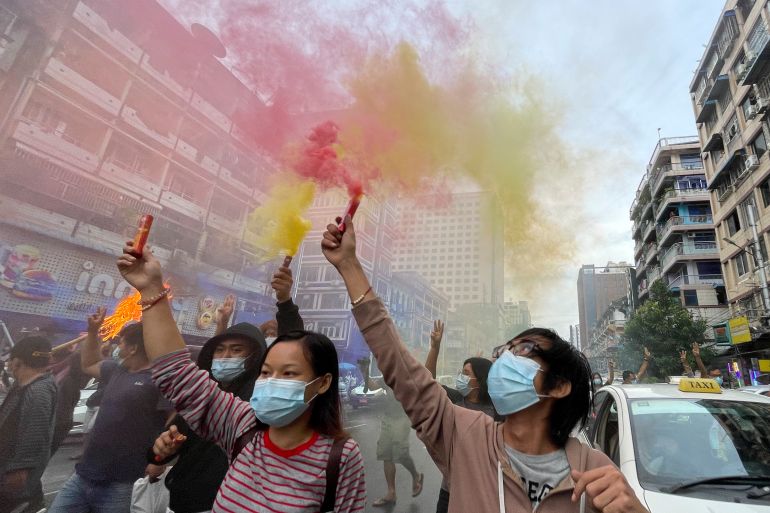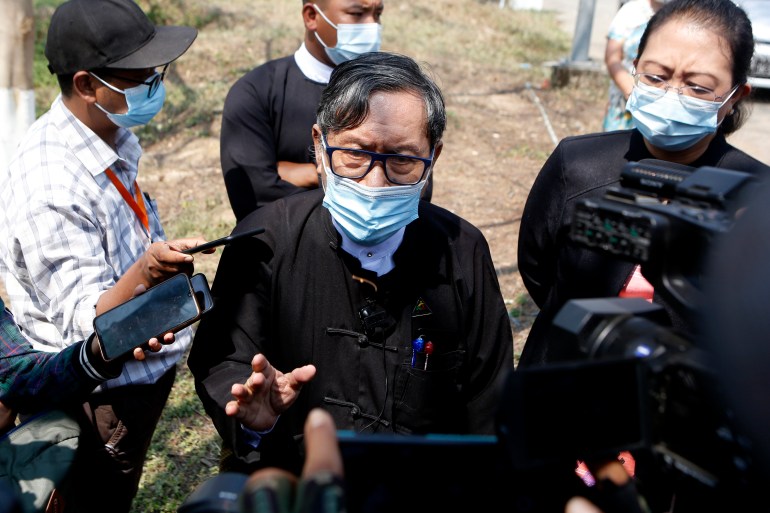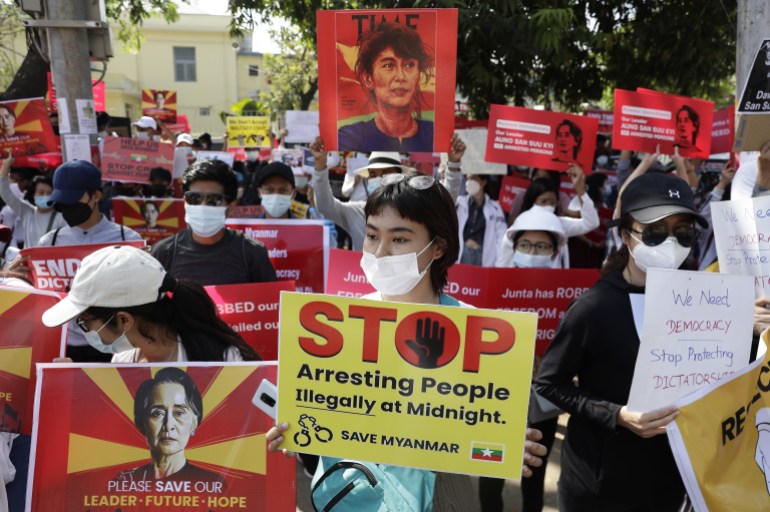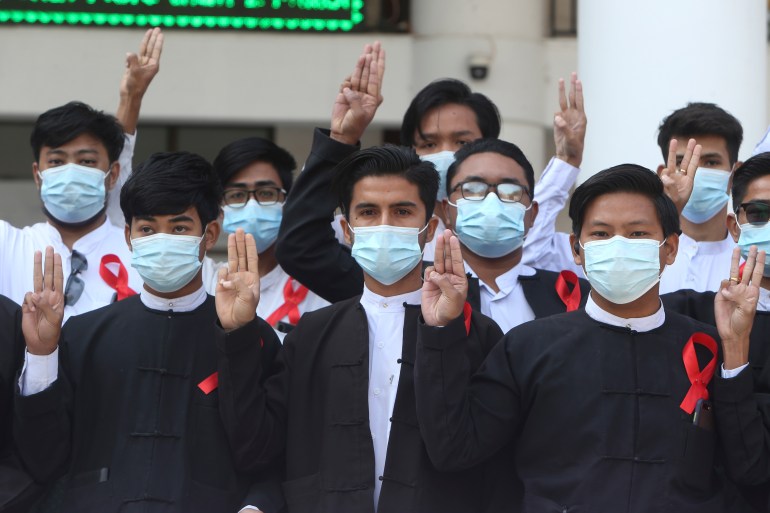Myanmar military targets lawyers defending political prisoners
Lawyers in Myanmar say situation becoming ‘very VERY difficult’ as regime steps up arrests and harassment.

As Myanmar’s military struggles to consolidate its control over a country in revolt, it has increasingly targeted a different type of resistance: lawyers defending political prisoners. In the past month, at least five lawyers have been arrested across Myanmar for defending politicians and activists, an escalation of the military’s assault on the judicial system.
First, in late May, police arrested Thein Hlaing Tun, the lawyer for deposed Naypyidaw Council chairman Myo Aung, a co-defendant of Aung San Suu Kyi. The former elected leader of Myanmar was overthrown by army chief Min Aung Hlaing in a military coup on February 1 after her National League for Democracy party won November’s election in a landslide.
Keep reading
list of 4 itemsHRW says Myanmar teenager tortured, subjected to mock burial
UN stops short of calling for global arms embargo against Myanmar
Detained US journalist makes appearance in Myanmar court
Since the coup, the military regime has killed some 883 civilian protesters and arrested, charged or sentenced more than 6,000 opponents according to the Assistance Association for Political Prisoners, which has been monitoring the situation.
Thein Hlaing Tun and five other lawyers were with their clients on May 24 when he was arrested and charged under section 505A, an incitement charge that carries a three-year prison sentence and has emerged as the favourite tool of the generals. Khin Maung Zaw, the head of Aung San Suu Kyi’s defence team, said Myo Aung was not informed of the arrest until he met the other lawyers on June 7.
“Then he appointed new lawyers among us,” Khin Maung Zaw said in a text message. “We’re worried about other lawyers,” he told Al Jazeera, saying the situation has become “very VERY difficult” due to the danger of “being harassed or arrested” and internal disagreements about how to proceed in a skewed legal system.
Soon after, on May 28, a lawyer from Ayeyarwady Region was arrested during a trial while defending a political dissident. According to local media, she had taken on a few high-profile clients, including the superintendent of a hospital who had gone on strike rather than work under the military regime. She too was charged under section 505A.

On June 2, lawyer Thet Tun Oo was arrested in Kachin state while attempting to attend a trial. He was reportedly representing more than 100 political prisoners, including detained members of the Kachin state government. One of his colleagues spoke to Al Jazeera on the condition of anonymity, for fear of reprisals, and said the arrest has escalated the climate of fear that already existed.
“After he was arrested, we went into hiding places, but we are also still trying to continue defending the cases,” she said. When lawyers go to defend cases, she said uniformed police often photograph and videotape them in an intimidating manner, and female lawyers have become too afraid to go into court alone.
The lawyer said before she went into hiding, she felt like she was constantly under surveillance, often noticing “strangers looking around my home”. She has also received suspicious phone calls from unknown numbers demanding to meet her for legal advice in person immediately, requests she is too afraid to accept.
“We know that we could be arrested, but I can’t avoid that. Because if we stop doing this, who will defend these cases?” she said.
‘No real justice’
On June 12, two lawyers were arrested in Kayin state while attempting to cross the border into Thailand, after finding out they were wanted by the military. Nilar and Phone Myat Thu were both part of the legal team for the Kayin state chief minister, who was removed from his post and charged along with most of the civilian leaders in February.

A close friend of both lawyers said he received a call from another mutual friend around midnight, telling him about the arrest.
“Both lawyers had been hiding in Myawaddy since they heard they will be detained soon … Until today, we haven’t seen them or met them,” he said. Like the others, they have been charged under section 505A.
“We feel like there isn’t any rule of law. If the lawyers were arrested like that, we should have a chance to meet and see them. Now, no one can protect us, even the law can’t protect our rights,” he said.
Phil Robertson, deputy director of Human Rights Watch’s Asia division, said the targeting of lawyers might also cut off a vital source of information about other detained prisoners.
“[R]estricting this relationship with clients through intimidation of lawyers will also mean there is less information coming from the prisons about what is happening to people inside,” he said, adding that such information has helped rights organisations document “torture and ill-treatment” inside the prisons.
Just last week, the deputy chairman of the Naypyidaw Council was able to reveal through his lawyer that he suffered a broken rib during interrogations. Lawyers are also often the only way for family and friends to communicate with their loved ones, and the only way for high-profile detainees to get messages out to the public.
“Arresting lawyers, and interrogating them about their activities and their clients, will ensure that no one wants to provide legal counsel to activists – which is probably the real intent of the junta’s actions here,” Robertson said, warning that “no real justice” will be found as long as the judicial system is “under the thumb of the military”.
The military takeover and subsequent pressure on the judicial system is also a blow to Myanmar’s younger generation, who came of age during a time when the country was opening up, and believed that things could be different.
A law student in Yangon said the coup has destroyed the hope she once had for her chosen profession and is making her question whether she should even finish her degree.
“Even though my hopes were up for the future … on February 1st, it all went down the drain,” she said. While she believed there were “a lot of flaws and defects” in the legal system before the coup, the situation has now “become even more dreadful”.

“What is [the law] if the junta is arresting everyone who disagrees?” she asked.
She said she wanted to become a lawyer to “give me strength, voice and confidence to help the society I live in” but instead she was beginning to feel “powerless”.
But she is not giving up.
The pressure on lawyers is also making people in the legal community “furious and motivated to fight this unfair and unjust system,” she told Al Jazeera. “Our generation should and must be the last one to experience a coup.”